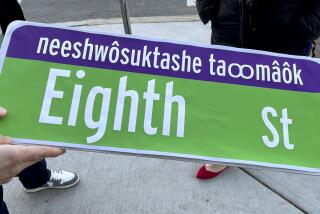‘Official English’ Statutes in Some States Breed Hot Words and Misunderstanding
GREELEY, Colo. — The sign said “No Ingles, No Travato” --a mangled attempt at the Spanish for “No English, No Work.”
But even if it had been spelled right -- “No Ingles, No Trabajo”-- the placard posted outside a construction site near Greeley probably would have been illegal, state and federal officials say.
Jorge Amaya, state director of the League of United Latin American Citizens, said he confronted the construction foreman at the Sand Livestock Systems construction trailer earlier last month, the day he spotted the sign.
“That sign was telling a whole group of people to get lost, and that’s discrimination,” he said.
“It’s exactly the kind of thing we feared when the official English amendment passed (in a 1988 referendum). I’ll tell you, if we put up a sign saying: ‘No more white people,’ we’d get nailed in seconds.”
The posting marks the latest shot fired in the battle over “Official English” statutes, which have been enacted in dozens of states in the last few years. They are intended to discourage bilingual education and other concessions to non-English-speaking immigrants.
Earlier last month, a federal judge in Phoenix tossed out Arizona’s Official English law, saying it violated the right to free speech. That law required state and county governments in Arizona to conduct most of their business in English only.
Colorado’s constitutional amendment is less specific--it simply declares English to be the official state language, without describing what that means.
To officials at a hog farm under construction for National Farms in Kersey, about 10 miles east of Greeley in north-central Colorado, the amendment meant that Spanish-speakers could be discouraged from applying for work.
“We had some pretty poor communications around here,” said project superintendent Al Benson. “We were getting so many people who couldn’t speak English. For example, I have a cement finisher I can’t even talk to.”
The sign was posted last summer, Benson said. He insisted that it was legal.
“We checked,” he said. “Because of the English-only bill we know it’s legal.”
But state and federal officials disagreed.
Ed Gibbs, regional officer for the Colorado Civil Rights Commission in Greeley, said the sign was “definitely illegal.”
No one had filed a complaint with his office, but Gibbs said he would investigate the incident and the company could be ordered to pay damages to anyone who could prove that they were discriminated against because of the sign.
Joe Esquibel of the U.S. Labor Department said the sign is “probably illegal” because the construction business isn’t one that requires English to be spoken.
Another Labor Department official, Loren Gilbert, said that unless English is an occupational qualification--as, for example, for a disc jockey--it is illegal to refuse to hire people because they don’t speak the language.
“You can’t tell me that English is a requirement for digging post holes,” he said.
Amaya of the League of United Latin American Citizens said he intends to file complaints with the Labor Department and the state civil rights commission.
The local manager for National Farms, Bill O’Hare, said he had been unaware of the subcontractor’s sign. He said National Farms allows “all people to apply for jobs and we do not discriminate in any manner.”
More to Read
Sign up for Essential California
The most important California stories and recommendations in your inbox every morning.
You may occasionally receive promotional content from the Los Angeles Times.










